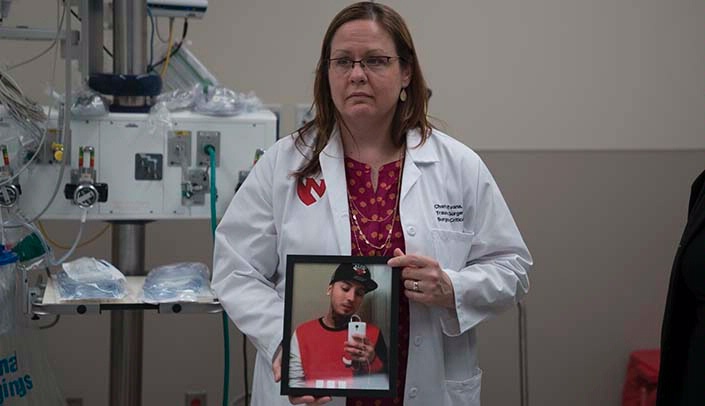About the program
The program starts in the trauma bay, where participants hear the story of Roberto Gonzalez, who was shot once in the chest on Jan. 22, 2015 at 24th and P streets in South Omaha at the young age of 20. He was rushed to Nebraska Medicine, where he died only 11 minutes later.
D2D participants will see the drastic measures taken in the attempt to save a life, including the instruments used and the trauma bay where it occurs.
“We want to show the kids what happens when someone gets shot, and the reality of the devastation caused by violence,” Dr. Evans said.
After the trauma bay, the participants will move to a conference room for an open discussion. Stewart Giddings, director of operations at You Turn, will share his story with the at-risk youth. Giddings was a member of a street gang in New York City during the 1990s. He saw his best friend get shot and killed.
His life took a turn for the better when he went to Morningside College in Sioux City, Iowa, to play football. He wound up earning a degree in communications in 2007. From there, he has held a number of jobs, serving in the behavioral health field and as manager of a drug and alcohol dependency unit. He also worked at the Omaha Home for Boys and the Douglas County Youth Center.
UNMC and its clinical partner, Nebraska Medicine, announced Monday the launch of the only hospital-based, youth violence prevention program in Omaha.
The program, called Dusk to Dawn (or D2D, for short), is patterned after a similar program implemented at Temple University Hospital in Philadelphia called Cradle to Grave. D2D was created from the hospital’s want to do more than simply treat victims of violence, but to also prevent the violence before it occurs.
Under the program, UNMC/Nebraska Medicine will bring in 12-15 at-risk youth once a month for a two-hour, 30-minute class. The youth will be junior and senior high students between the ages of 13 and 19.
“These will be young people at risk for violence,” said Charity Evans, M.D., assistant professor, UNMC Department of Surgery-Division of General Surgery, and coordinator of the D2D program. “They might be gang members or kids who have dropped out of school or been skipping classes. We want to shift their way of thinking and teach them decision-making skills that will allow them to avoid risky situations and stay out of trouble.”
“You never know what’s going to reach a kid,” said Lt. Ken Kanger, director of OPD’s Gang Unit. “It could be a class like this. It could be getting them in athletics or other extracurricular activities. We think D2D will give them a whole different perspective.”
D2D is a collaborative effort between Nebraska Medicine, the Omaha Police Department, the Boys & Girls Club of the Midlands, and YouTurn. It was created by Dr. Evans and Ashley Emmel, trauma outreach coordinator at Nebraska Medicine.
Stewart Giddings, director of operations at You Turn, called violence a health issue.
“You have to treat it the same way you treat any transmittable disease,” he said. “It’s truly a learned behavior that is transmitted from individual to individual.
“We want to show these kids the side of violence that they don’t see — the impact on the violence victim. They don’t think of the collateral damage and effect that happens. How the incident impacts families, communities, even the physicians and health care staff. We’ll show them that these problems can all be prevented.”
The first class was held April 26 at UNMC/Nebraska Medicine, Dr. Evans said. Subsequent classes will be once a month between 6 and 8:30 p.m. In addition, community leaders, including those from Girls Inc., Douglas County Youth Center, Nebraska Correctional Youth Facility, Omaha Police Department, Omaha Fire Department and the Mayor’s Office, received a sneak preview of the program on April 24.
Dr. Evans plans to expand the program over the next year to include referrals from across Omaha.
The program is funded by a three-year, $100,000 grant from UNMC. Dr. Evans is currently applying for additional grants to gain sustainability for the program.
For more information on the D2D program, email Emmel or call 402-559-9154.
